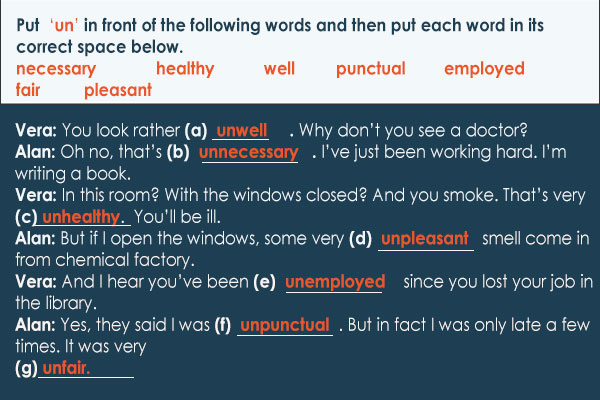| Adjectives |
|---|
| Assessment questions |
An adjective is a word that describes, identifies, modifies, or quantifies something (a noun or a pronoun).
In the phrase, "the black cat" the word black is an adjective because it describes the cat.
Adjective answer four questions:
1. Quantity - few, no, one, two, three, four, little, several, many, all, some, every, each, ...
2. Opinion - good, better, best, bad, worse, worst, wonderful, splendid, mediocre, awful, fantastic, pretty, ugly, clean, dirty, wasteful, difficult, comfortable, uncomfortable, valuable, worthy, worthless, useful, useless, important, evil, angelic, rare, scarce, poor, rich, lovely, disgusting, amazing, surprising, loathesome, unusual, usual, pointless, pertinent,
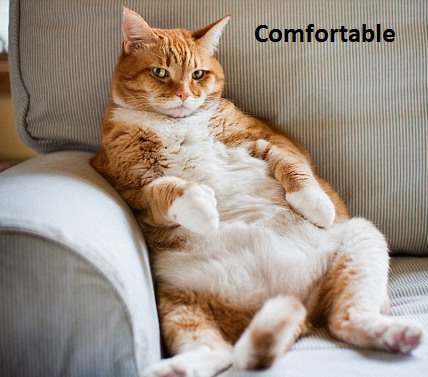
3. Personality/emotion - happy, sad, excited, scared, frightened, outgoing, funny, sad, zany, grumpy, cheerful, jolly, carefree, quick-witted, blissful, lonely, elated, ...
4. Sound - loud, soft, silent, vociferous, screaming, shouting, thunderous, blaring, quiet, noisy, talkative, rowdy, deafening, faint, muffled, mute, speechless, whispered, hushed, ...
5. Taste - sweet, sour, acidic, bitter, salty, tasty, delicious, savory, delectable, yummy, bland, tasteless, palatable, yummy, luscious, appetizing, tasteless, spicy, watery, ...
6. Touch - hard, soft, silky, velvety, bumpy, smooth, grainy, coarse, pitted, irregular, scaly, polished, glossy, lumpy, wiry, scratcwhy, rough, glassy, ...
7. Size, eight - heavy, light, big, small, little, tiny, tall, short, fat, thin, slender, willowy, lean, svelte, scrawny, skeletal, underweight, lanky, wide, enormous, huge, vast, great, gigantic, monstrous, mountainous, jumbo, wee, dense, weighty, slim, trim, hulking, hefty, giant, plump, tubby, obese, portly, ..
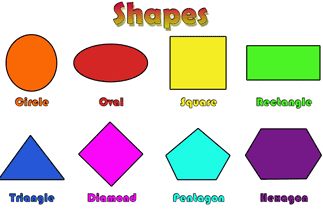
Positive, comparative and superlative
Two or three items are compared in different ways. Study this table:
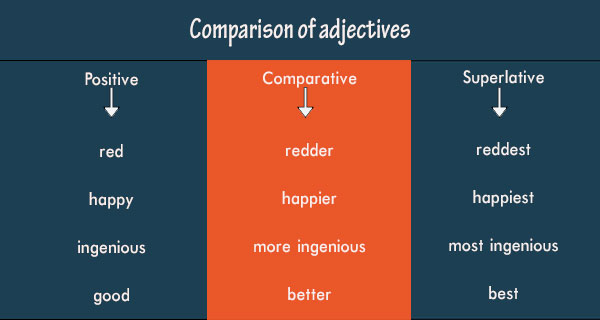
Order of adjectives
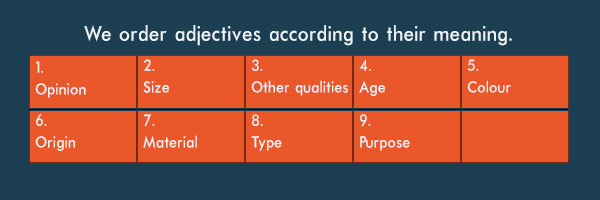
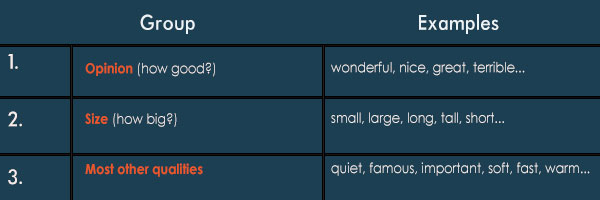
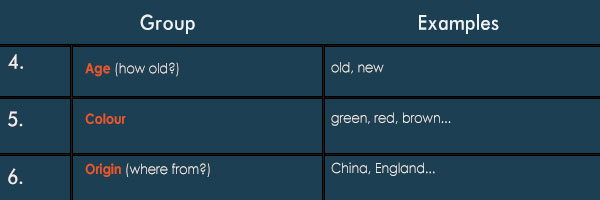
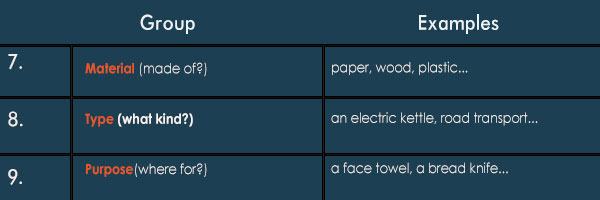
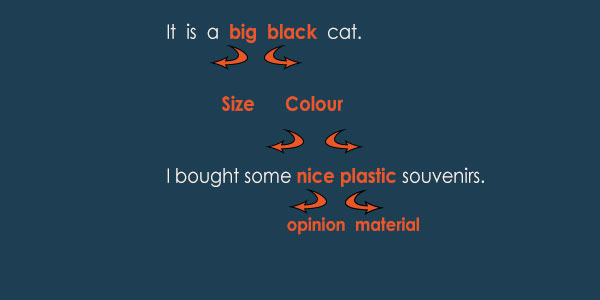
Adjectives describing general characteristics
But if there are more than two adjectives, the following order is used:
opinion — size — age — material — origin — noun
[resource: 869, align: left]
There are many adjectives that we have in English that end in -ED or -ING.
Yes, that's correct, they are not only endings that we use for verbs!
An adjective that ends in -ING is used to describe: the characteristic of a person or a thing.
An adjective that ends in -ED is used to describe: a feeling.
Compare the difference:
You can use these adjectives to describe people or situations but be careful that you are using the correct adjective. For example, there is a big difference in meaning between:
Of course, you could also find both adjectives in the same sentence. Then you really need to concentrate on the intent / context of the sentence.
Examples:
There are many adjectives ending in -ED and -ING in English, and most of them are based on a verb that can be changed into an adjective by adding either -ED or -ING.
Some of them include:
Two adjectives are sometimes used to form adjective compounds.
A compound adjective is sometimes called a hyphenated adjective. What are they?
Let's look at the following sentences:
The first sentence contains a compound adjective.
The second sentence doesn't.
However the meaning of the two sentences are very different as can be seen in the picture below:
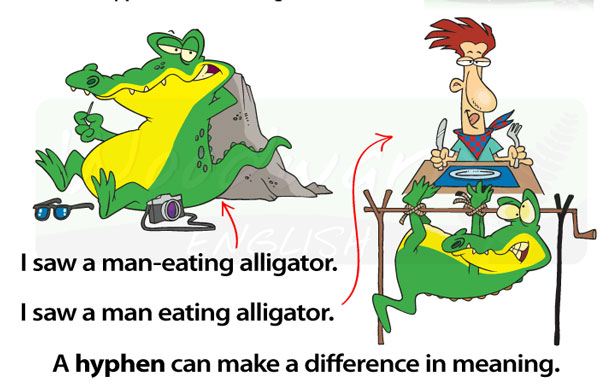
I saw a man-eating alligator.
We are describing the alligator. What type of alligator is it? It is one that eats men (or people).
I saw a man eating alligator.
This sentence without the hyphen sounds like a man is eating an alligator.
(man is the subject, eating is the verb, alligator is the object or thing that is being eaten).
As you can see, the hyphen (or lack of it) makes a big difference in the meaning of the sentence.

When he have compound adjectives using numbers + a time period, that word referring to a time period is in singular form and is joined to the number with a hyphen.
Notice how we normally write the number as a word, not in numerical form.
Adverbs modify a verb.
Example
She walks slowly.
How does she walk? Slowly. Slowly is an adverb that modifies (or describes) the verb.
Adverbs can also be used to modify an adjective.
Notice how we do not put a hyphen between an adverb and an adjective (not even before a noun).
However when we have an Adverb + past participle, we put a hyphen between the two words to make it a compound adjective.
When we have a noun + past participle, we put a hyphen between the two words to make it a compound adjective.
When we have a noun + present participle, we put a hyphen between the two words to make it a compound adjective.
When we have a noun + adjective, we put a hyphen between the two words to make it a compound adjective.
When we have an adjective + noun, we put a hyphen between the two words to make it a compound adjective.
When we have an adjective + past participle, we put a hyphen between the two words to make it a compound adjective.
When we have an adjective + present participle, we put a hyphen between the two words to make it a compound adjective.
A proper noun is the name of something or someone (e.g. John, Susan Sanders).
Compound Adjectives made from Proper nouns don't need a hyphen though must have capital letters.
James Jackson is a compound adjective describing the tickets (What type of tickets? James Jackson tickets). Since the adjective is a Proper noun, we don't need a hyphen between the two names.
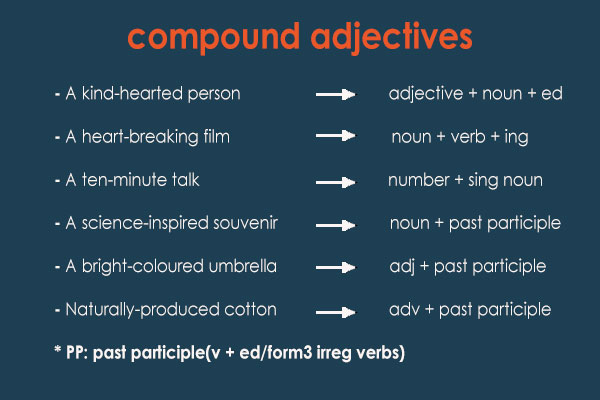
 Please request a four-foot table.
Please request a four-foot table. It is a 6-page document.
It is a 6-page document. Claire worked as a part-time keeper at the safari park.
Claire worked as a part-time keeper at the safari park. Please request a four-foot table.
Please request a four-foot table. It is a 6-page document.
It is a 6-page document. Claire worked as a part-time keeper at the safari park.
Claire worked as a part-time keeper at the safari park.
An adjective phrase is a group of words that describe a noun or pronoun in a sentence.
An adjectival phrase can be made by combining more than one adjective:
The rich chocolate melted in her mouth.
(adjective)
The rich and creamy chocolate melted in her mouth.
(adjectival phrase)
An adjectival phrase can give more detail about a noun. It can help to answer the questions:
a) Which chocolate?
b) What was the chocolate like?
eg She tasted the chocolate in the silver wrapper.
An adjectival phrase can come before or after a noun.
She tasted the chocolate which was melting fast.
She tasted the fast-melting chocolate.
The correct use of: each, every, some and any, few, a few, the few.
Consider the following:
Each can be used in front of the verb:
The soldiers each received a medal.
Each can be followed by 'of':
Every cannot be used for 2 things. For 2 things, each can be used.
He was carrying a suitcase in each hand.
Every is used to say how often something happens:
- Each and every
- Some and any ‘some’ and ‘any’ are both adjectives of quality.
Some is used in positive sentences:
'I have some friends.'
'We bought some coffee.'
'Would you like some milk?
Some is also used in questions when we are making a request:
'Can I borrow some money?'
Any is used in negative sentences:
'I don't have any friends.'
'There isn't any bread left.'
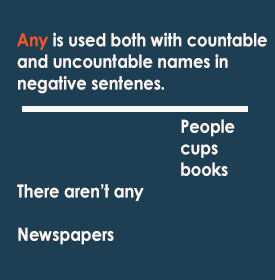
Any is used in questions:
'Do you have any money?'
'Is there any sugar?'
(c) few, a few and the few
‘ few ’ on its own has a negative meaning. It is roughly equivalent to not many, hardly any.
Example: 
‘a few’ has a positive meaning.Mean a small quantity. It is roughly equivalent to some.It goes before countable nouns
Example: 
‘the few’ is also quite positive. It is roughly equivalent to not many but the only ones there are.
Example:She doesn’t know many people but the few friends she has all like her a lot.
The video below explains more on the use few, a few and the few:
Here is a video on order of adjectives:
Observe the Rules
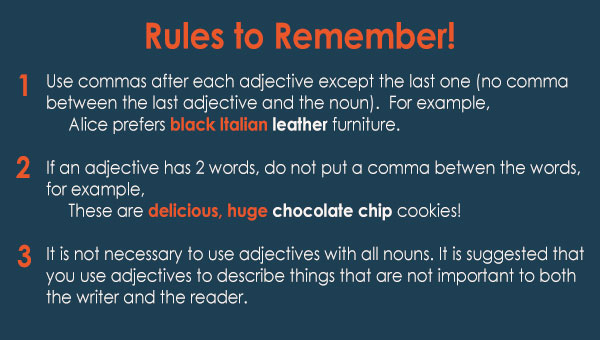
Rewrite the sentences using the adjectives in blue/brackets.
Be sure to write them in the correct order.
1. Aunt Betty wants a coffee table. (stone, square, gray)
2. The king took a trip. (2-week, exhausting)
3. These are cookies! (chocolate chip, delicious, huge)
4. Alice prefers furniture. (leather, Italian, black)
5. Archeologists get very excited when they find bones. (animal, large, prehistoric)
1. Aunt Betty wants a square, gray, stone coffee table.
2. The king took an exhausting,2-week trip.
*exhausting refers to opinion
3. These are delicious, huge, chocolate chip cookies!
*chocolate chip refers to a material used to make the cookies
4. Alice prefers black, Italian, leather furniture.
5. Archeologists get very excited when they find large, prehistoric, animal bones.
Mitigators are the opposite of intensifiers. When we want to make an adjective less strong we use these words:
fairly - rather - quite
Fairly is an adverb of degree. It generally modifies adjectives and adverbs.
Fairly does not suggest a very high degree.
Quite suggests a higher degree than fairly.
Quite can modify adjectives, adverbs, verbs and nouns.
Rather is stronger than quite. It suggests ideas such as ‘more than is usual’, ‘more than was expected’ or ‘more than was wanted’.
Rather can modify adjectives, adverbs, verbs and nouns.
Pretty is similar to rather.
Pretty can modify adjectives and adverbs. It can’t modify nouns or verbs.
We call these words mitigators.
When we use quite with a strong adjective it means the same as absolutely:
The food was quite awful. = The food was absolutely awful.
As a child he was quite brilliant. = As a child he was absolutely brilliant.
Use of prefix un and adjectives to form opposites
Negative statements are the opposite of affirmative statements.
In English, one way to make negative statements is by adding negative prefixes to nouns, adjectives, and verbs.
For example, the prefix un- can be attached to the adjective happy to create the negative adjective unhappy.
Words that take un- as a negative prefix may begin with a vowel or consonant.
